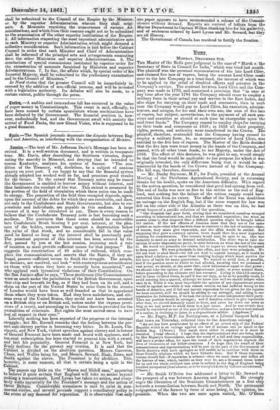Ameriss.--The text of Mr. Jefferson Davis's Message has been re-
ceived. It is a well-written document, and is written in temperate tone. Mr. Davis, after describing the Southern -victories, depre- cating the anarchy in Missouri, and denying that he intended to coerce Kentucky, analyzes his system of finance. "The con- dition of the Treasury, will, doubtless, be a subject of anxious inquiry on your part. I am happy to say that the financial system already adopted has worked well so far, and promises good results for the future. To the extent that Treasury notes may be issued the Government is enabled to borrow money without interest, and thus facilitates the conduct of the war. This extent is measured by the portion of the field of circulation which these notes can be made to occupy. The proportion of the field thus occupied depends,
upon the amount of the debts for which they are receivable, and ues, not only to the Confederate and State Governments, but also to cor- porations and individuals, are payable in this medium. A large amount of it may be circulated at par. There is every reason to believe that the Confederate Treasury note is fast becoming such a medium. The provision that these notes should be convertible into Confederate Stock bearing 8 per cent. interest, at the plea- sure of the holder, ensures them against a depreciation below the value of that stock, and no considerable fall in that value need be feared no long as the interest shall he punctually paid. The punctual payment of this interest has been secured by the Act, passed by you at the last session, imposing such a rate of taxation as must provide sufficient means for thatpurpose." He suggests the construction of 40 miles of railroad, which com- plete the communication, and asserts that the States, if they are frugal, possess sufficient means to finish the struggle. The people, he declares, are resolved, and look" with contemptuous-astonishment on those with whom they have so recently been associated," and who applaud such tyrannical violations of their Constitution. On the San Jacinto affair he says, "These gentlemen (the Commissioners) were as much under the jurisdiction of the British Government, upon that ship and beneath its flag, as if they had been on its soil, and a claim on the part of the United States to seize them in the streets of London would have been as well founded as that to apprehend them where they were taken. Had they been malefactors, and citi- zens even of the United States, they could not have been arrested on a British ship or on British soil, unless under the express provi- sions of a treaty, and according to the forms therein provided for the extradition of criminals. But rights the most sacree seem to have lost all respect in their eyes."
Literally nothing has been reported of the progress of the internal struggle; but Mr. Russell remarks that the feeling between the pro- and anti-slavery parties is becoming very bitter. In St. Louis, Cin- cinnati, and New York, violent speeches against slavery and in favour of General Fremont have been made and heard with applause, and a ten-cent subscriptiOn has been started to present him with a sword, and test his popularity. General Fremont is at New York, but firmly declines for the present any ovation. It is said that the Cabinet is divided on the abolition question. Messrs. Cameron, Chase, and Welles being for, and Messrs. Seward, Blair, Bates, and Smith against the slaves. The President is for abolition. This, however, is mere rumour, all that is certain being a split in the Cabinet.
The papers say little on the "Mason and Slidell case," appearing to believe it quite certain that England will take no notice beyond making a remonstrande. Lord Lyons has taken no action, and every- body waits apparently for the President's message and the action of Great Britain. Considerable uneasiness is said to exist in com- mercial circles, and several journals support a conciliatory policy in the event of any demand for reparation. It is observable that only
one paper appears to have recommended a release of the Commis- sioners without demand. Reports are current of letters from the Marine Department to Captain Wilkes thanking him for his gallantry, and of sentences uttered by Lord Lyons and Mr. Seward, but they are all illusory.
The Government of Canada has resolved to fortify the frontier.






























 Previous page
Previous page